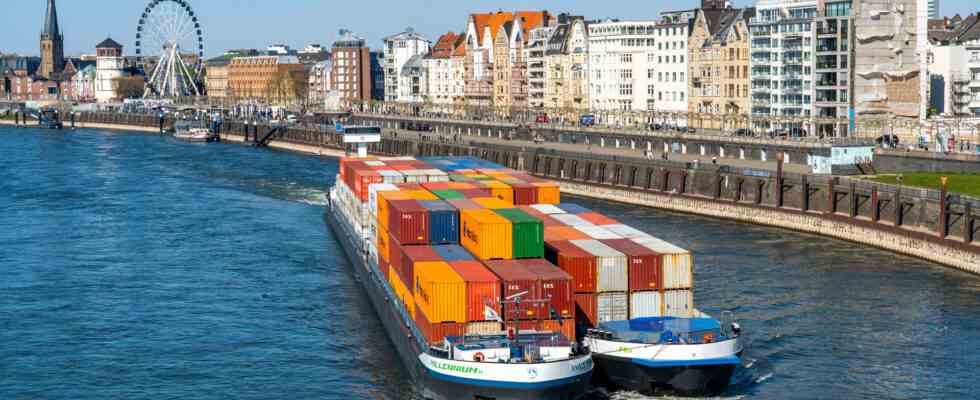Status: 02.01.2023 2:30 p.m
Despite the ongoing risk of inflation and the corona wave in China: Bundesbank boss Nagel and Wirtschaftsweise Malmendier do not expect a deep economic slump in Germany in 2023.
The consequences of the war in Ukraine and high inflation continue to weigh on the German economy. Many economists therefore expect Europe’s largest economy to shrink. However, the economic picture is no longer viewed as bleakly as it was a few months ago.
The Bundesbank sees it that way, as does business wise Ulrike Malmendier. The top economist expects two consecutive quarters of shrinking economic output. “But now I’m optimistic enough to say: We’re not experiencing a mega-recession and certainly not a de-industrialization of Germany,” she said in an interview with the “Handelsblatt”.
Nagel expects inflation to fall
Bundesbank boss Joachim Nagel also assumes that Germany will get away with a mild downturn. He has been President of the Bundesbank for a year and would not have thought what could happen in a year and how difficult the situation would be, Nagel said in an interview with the “Journal for the Entire Banking System”. “Nevertheless, I’m optimistic that we can avoid a severe economic downturn in Germany and get away with a mild downturn,” he added.
Nagel expects the inflation rate to fall in 2023. However, this will not be strong enough to be able to achieve the target value of two percent aimed at by the ECB. The inflation rate in the euro zone was 10.1 percent in November. That’s five times the ECB’s target. “For me, that means that our job is not done yet. We have to take further measures,” said the central banker.
The European Central Bank recently took its foot off the gas a bit in its monetary policy tightening course. After two unusually large hikes of 0.75 percentage points each, it raised key interest rates by 0.50 percentage points in December. ECB President Christine Lagarde also announced further hikes. She made it clear that interest rates must continue to rise at the pace of 0.50 percentage points for a period of time to dampen inflationary pressures.
Inflation estimate expected for December
According to economists’ forecasts, the inflation rate in Germany fell significantly at the end of 2022 due to falling energy prices. It is likely to have fallen to nine percent in December from ten percent in November, according to the average economists from 16 banks surveyed by the Reuters news agency. In October, the inflation rate reached 10.4 percent, its highest level since 1951. The Federal Statistical Office intends to publish an initial estimate for the development of consumer prices in December on Tuesday.
“If inflation has really fallen that much, it has less to do with the energy price brake and much more to do with the significantly lower oil and petrol prices,” said ING chief economist Carsten Brzeski. “We will not see the energy price brake in the data until March.” The state took over the down payments for natural gas in December. For private consumers of gas, electricity and district heating, a statutory maximum price for 80 percent of the previous year’s consumption will also apply from March; this price cap is credited retrospectively for January and February.
However, experts are not yet giving the all-clear. “In the coming months, inflation could well rise again,” said Brzeski. Many consumers would not be presented with the increased gas and electricity prices until January. Food could also become more expensive, since prices in agriculture are often renegotiated in January. “On the other hand, falling demand can certainly ensure that retailers want to sell their goods at low prices,” said Brzeski, who expects an average inflation rate of 8.5 percent for the first quarter that has just begun.
Malmendier: The situation in China is worrying
According to Malmendier, the high energy prices are an enormous burden for the economy: “But the companies are also extremely adaptable. The prices are already falling again.” Wholesale gas prices in Europe have fallen further. The reference futures contract TTF on the energy exchange in the Netherlands was this morning at EUR 72.75 per megawatt hour for deliveries in February. This is the lowest level since February 21, 2022; the record high was reached last summer at 345 euros.
At the same time, Malmendier has another concern: “The situation in China worries me,” said the economics professor from the US University of Berkeley, who has been a member of the German Council of Economic Experts (SVR) since September.
In view of the corona wave in the People’s Republic after the abrupt departure from the strict zero-Covid course and the resulting economic consequences, it is important for Germany to draw up an emergency plan: “If the Chinese ports and factories are closed because almost all employees are sick are going to have dramatic economic consequences,” warned the economist. In their opinion, the supply chains would then collapse again, driving up the prices for raw materials and intermediate products enormously. “I very much hope that the federal government will already develop emergency plans for this case.” Germany needs a “China protection crash course”.
From zero covid to hundred percent covid policy
China’s head of state Xi Jinping has noticed that his zero-Covid policy has failed. “Now the pendulum is swinging to the other side: Beijing is apparently pursuing a 100 percent Covid policy instead of a zero Covid policy. But if the easing in China goes too far, the number of infections will explode,” warned the member of the Expert committee that advises the federal government on economic issues. There are already fears that there could be several million deaths. Because the People’s Republic does not have a working vaccine.
Since there is one in Europe, Malmendier believes it would be good if China allowed and bought it to protect its population: “At the same time, it would be enormously important for the economy, both in China and for us and other trading partners. “

